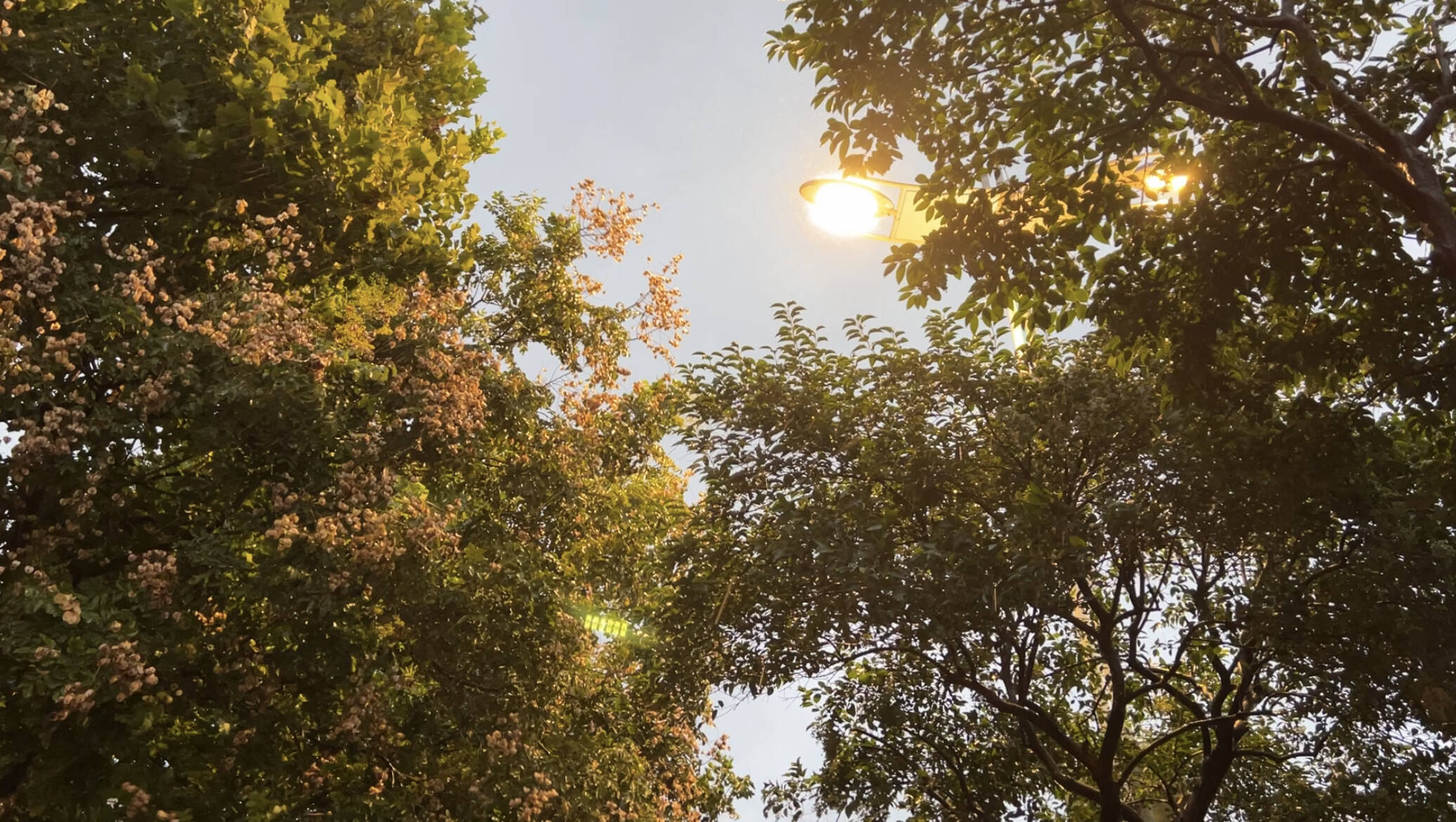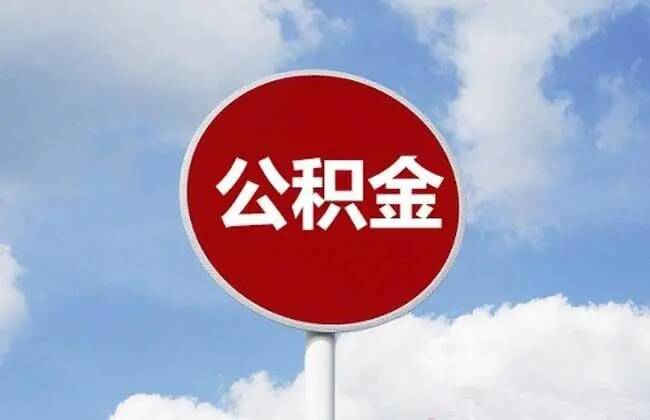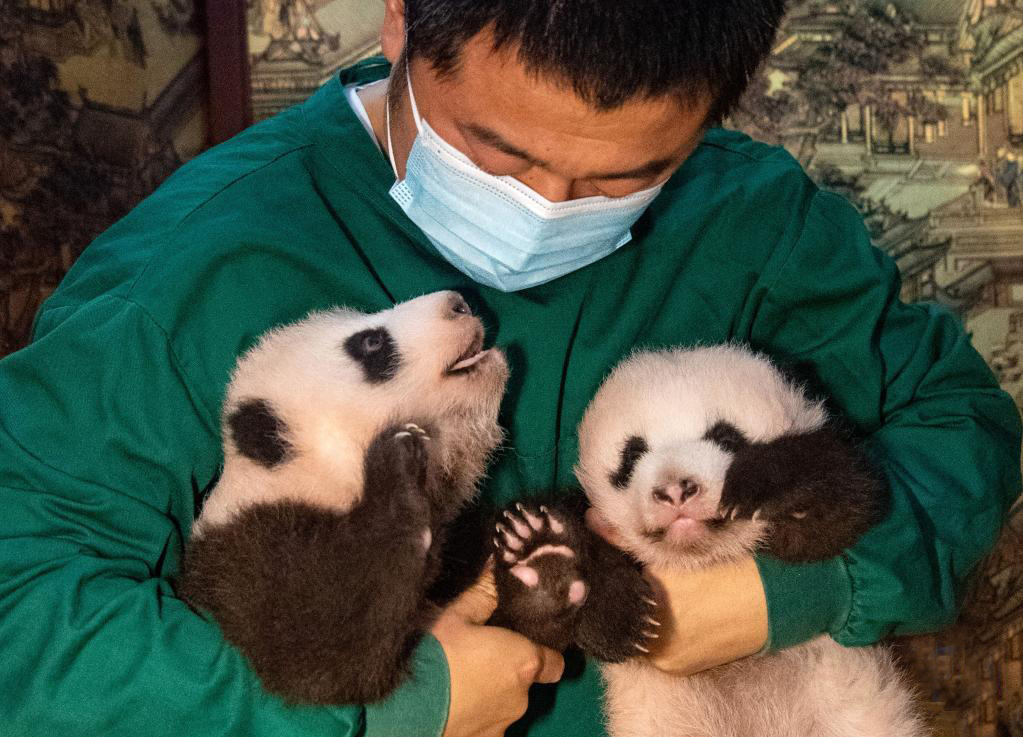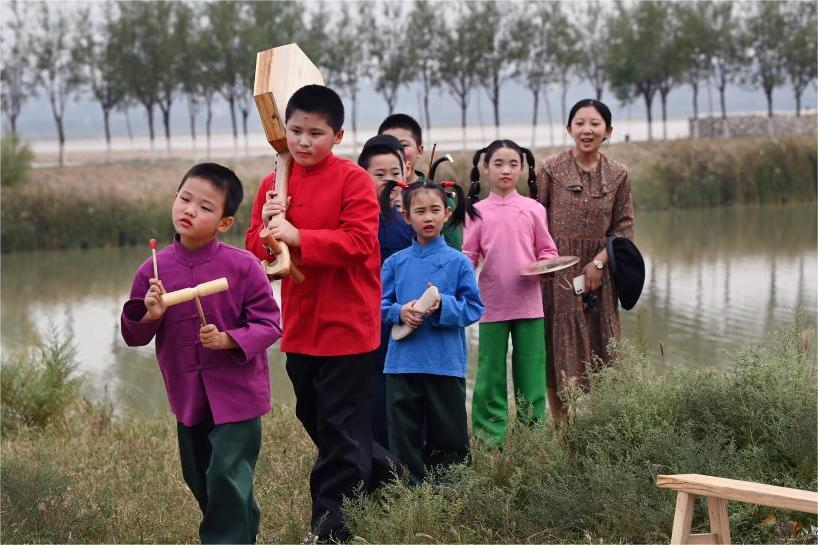Chinese keyword & Chongyang Festival
來源:
2022-10-05 20:31:10
The written word and tradition in China
Editor's note: The Chinese character 敬 ("jing"), meaning respect or to show respect, is a keyword for China's Chongyang Festival. It falls on the ninth day of the ninth lunar month, usually in October. This year, it falls on Oct. 4.
"Chong" in Chongyang means double, and "yang" refers to the number nine as the ancient Chinese people regarded nine as a "yang" number. Therefore, the name of the Chongyang Festival, which is also called Double Ninth Festival, comes from when two nines appear on the ninth day of the ninth lunar month.
As an old Chinese farming proverb goes, "With the arrival of the double ninth, stop working and have a rest." This refers to the fact that farming activities have been basically completed around the time of the Chongyang Festival, and a wide range of ritual activities are expected to be held to celebrate the year's harvest.
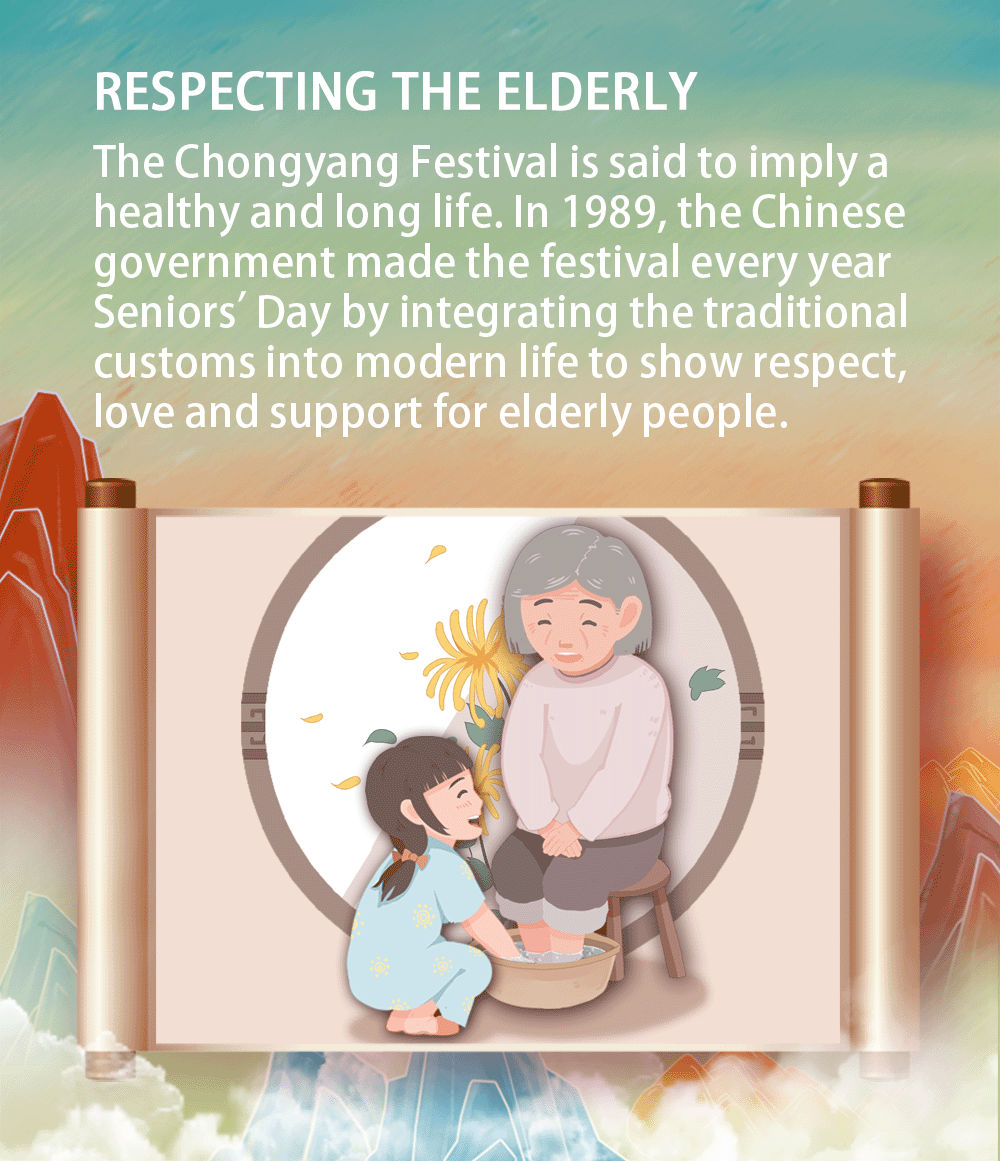
Respecting the elderly
The number nine is the largest of the "yang" numbers. When two "nines" are read together, its pronunciation is similar to the Chinese word meaning long-lasting. Therefore, the Chongyang Festival is said to imply a healthy and long life. In 1989, the Chinese government made the ninth day of the ninth lunar month every year Seniors' Day by integrating the traditional customs into modern life to show respect, love and support for elderly people.
1 2 3 4 5 6 >

Enjoying feasts to pray for longevity
The custom of enjoying a feast to pray for longevity on the Chongyang Festival has been recorded in some ancient works. It embodies people's wishes for the health and longevity of their elders and enjoys great popularity throughout the country. It is said that this custom developed from sacrificial banquets planned to celebrate the harvest. On the basis of offering sacrifices to heaven and one's ancestors, praying for longevity and having a feast were added to form the basis of the Chongyang Festival, which continue to this day.
1 2 3 4 5 6 >

Legend of Chongyang Festival
According to legend, there was a plague demon living in Runan county during the Eastern Han dynasty (25-220). On the ninth day of the ninth lunar month every year, the demon would come out to wreak havoc, forcing the people into poverty and despair. One day, a young man named Heng Jing decided to vanquish the demon. Having gone through many hardships and difficulties, he finally found a fairy master with strong powers, and learned swordsmanship. After he returned to his hometown, he gave each of the villagers a sprig of dogwood and a cup of chrysanthemum wine, as the fairy had told him, to drive away the demon and then he killed it. From then on, the custom of wearing dogwood sprigs and drinking chrysanthemum wine during the Chongyang Festival has been passed down.
1 2 3 4 5 6 >
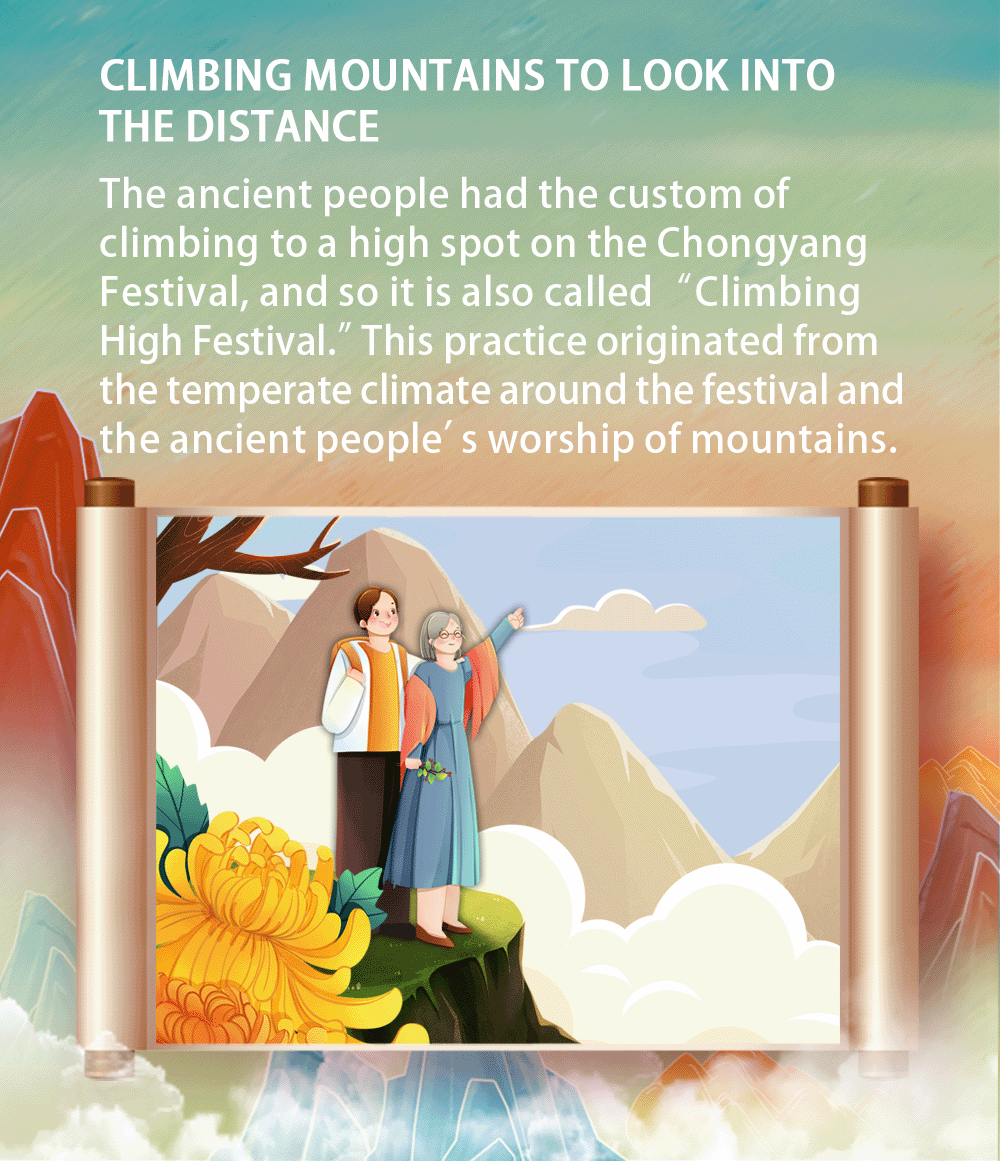
Climbing mountains to look into the distance
The ancient people had the custom of climbing to a high spot on the Chongyang Festival, and so it is also called "Climbing High Festival." This practice originated from the temperate climate around the Chongyang Festival and the ancient people's worship of mountains. Meanwhile, as October sees the arrival of fall with clear skies and bracing air, it is a good time for getting outdoors. Climbing mountains to look into the distance allows people to relax and enjoy themselves.
1 2 3 4 5 6 >
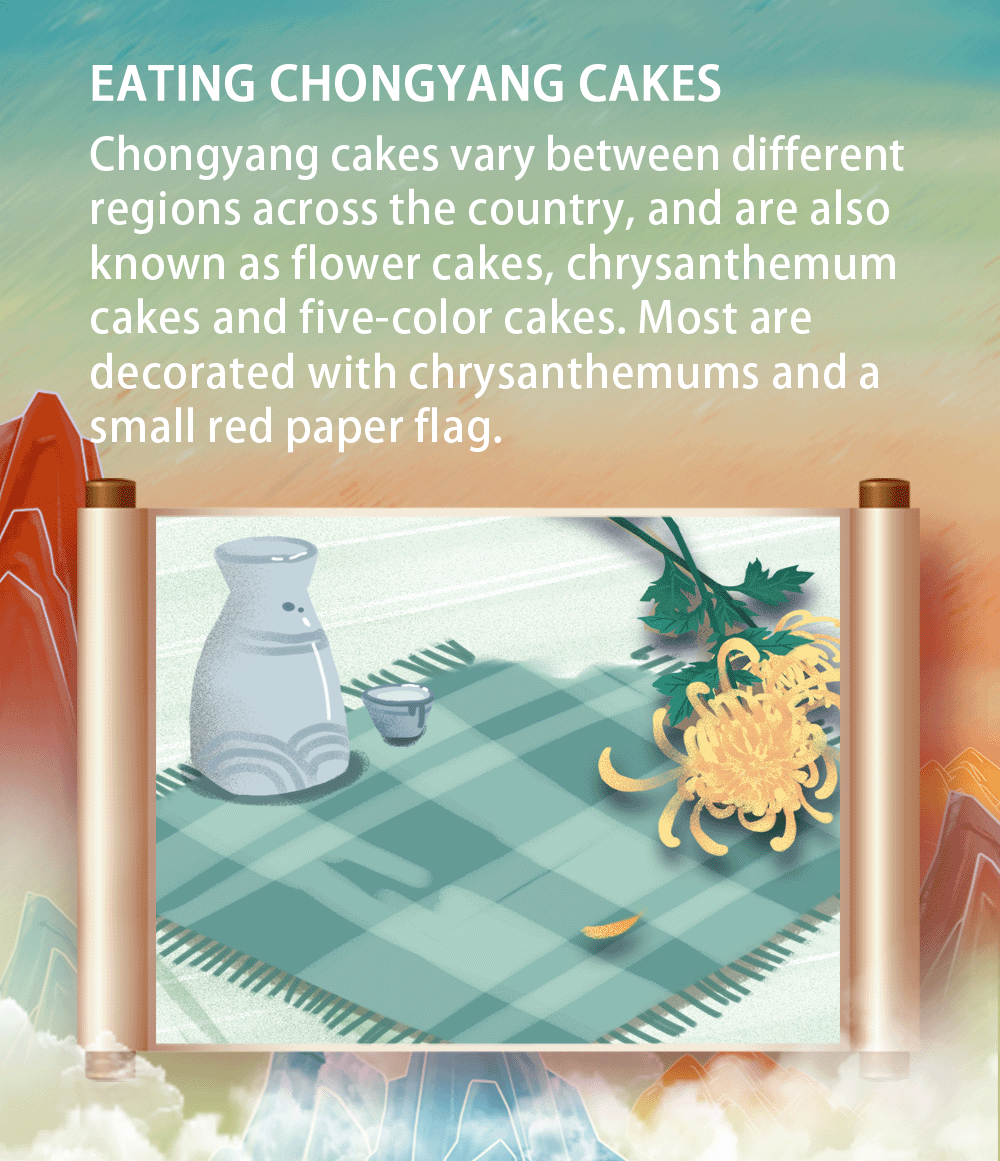
Eating Chongyang cakes
Chongyang cakes vary between different regions across the country, and are also known as flower cakes, chrysanthemum cakes and five-color cakes. Most are decorated with chrysanthemums and a small red paper flag. The word "cake" in Chinese has the same pronunciation with "height" ("gao" in pinyin), and so symbolizes climbing high. At dawn on the festival, a piece of cake is pressed against children's foreheads, and parents will express their wishes for their children to "achieve height." This is the original intention of the ancients in making cakes during the festival.
1 2 3 4 5 6 >
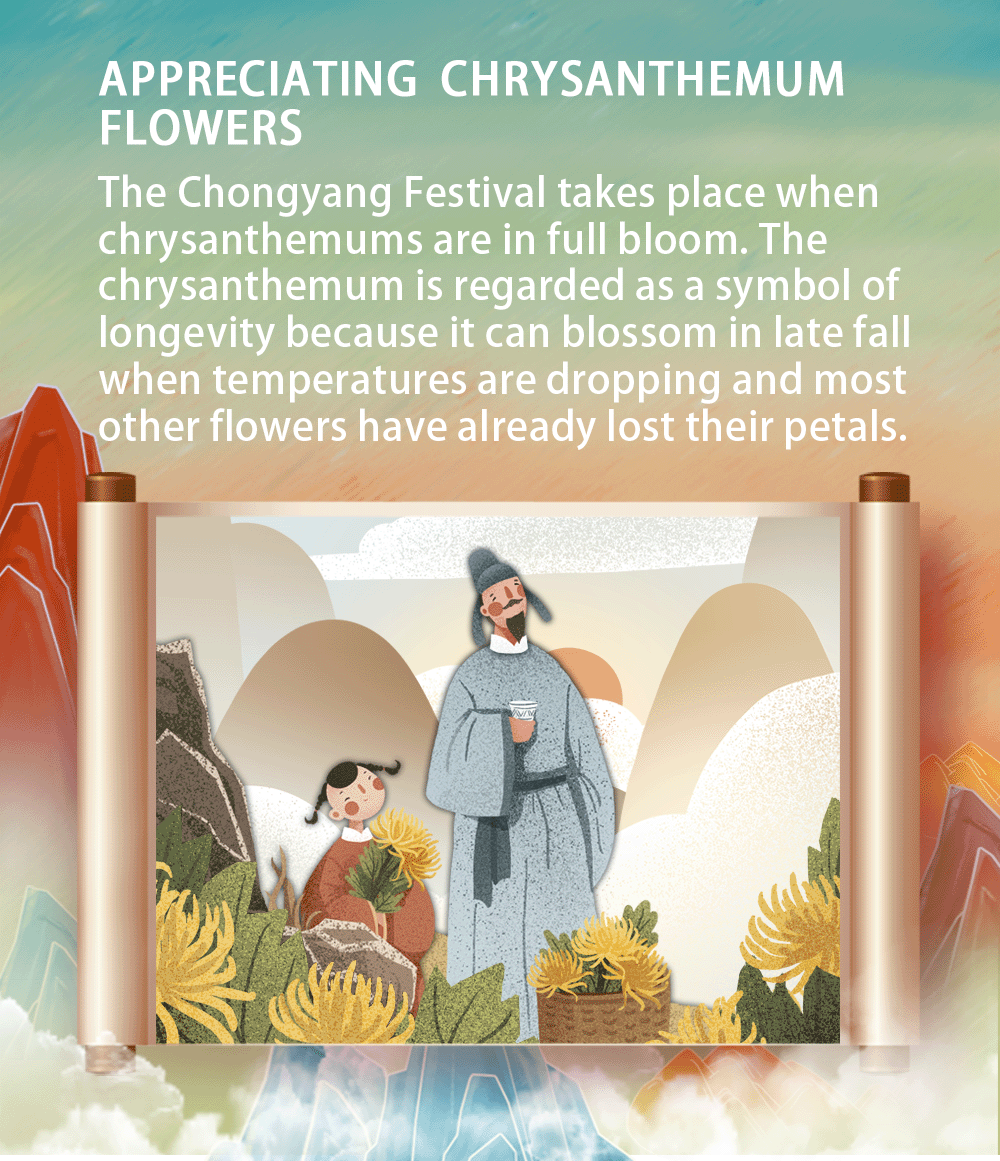
Appreciating chrysanthemum flowers
The Chongyang Festival takes place when chrysanthemums are in full bloom. The chrysanthemum is regarded as a symbol of longevity by the Chinese people because it can blossom in late fall when temperatures are dropping and most other flowers have already lost their petals. Since the Three Kingdoms period (220-280), and the Wei and Jin dynasties (220-420), it has become fashionable to drink wine, appreciate chrysanthemums and compose poems on the Chongyang Festival.
1 2 3 4 5 6
想爆料?請登錄《陽光連線》( https://minsheng.iqilu.com/)、撥打新聞熱線0531-66661234或96678,或登錄齊魯網官方微博(@齊魯網)提供新聞線索。齊魯網廣告熱線0531-81695052,誠邀合作伙伴。
Culture fact: keywords in China's Double Ninth Festival
- China's Double Ninth Festival, also referred to as the Chongyang Festival, falls on the ninth day of the ninth Chinese lunar month...[詳細]
- 2022-10-05
China made solid progress on elderly care over past decade: NHC
- Chinahasseenremarkableprogressonelderlycareoverthepastdecadeamidcontinuouseffortstoimproverelevantpoliciesandsystems,andtheimpleme...[詳細]
- 2022-10-05
當中與國相遇,發生了神奇的化學反應
- 作者 翁子茜姜媚李美燕成靜嵐陳偉責編 秦雅楠[詳細]
- 海外網手機版-資訊 2022-10-05
柬埔寨進入“高速公路時代”(共建“一帶一路”)
- 由中國路橋工程有限責任公司投資、建設和運營的柬埔寨金港高速公路10月1日通車試運營,這是柬埔寨第一條高速公路。10月1日,收費員在柬埔寨...[詳細]
- 人民日報客戶端-人民日報 2022-10-05
中國代表敦促美國切實解決國內警察暴力等種族歧視問題
- 中國代表蔣端公使10月3日在聯合國人權理事會第51屆會議指出美國非洲裔面臨執法不公,敦促美方切實采取行動解決國內系統性種族主義、種族歧...[詳細]
- 央視新聞客戶端-24小時 2022-10-05
中國國際影響力、感召力、塑造力顯著提升(和音·大國外交砥礪前行②)
- 在習近平外交思想指引下,中國外交戰勝了許多艱難險阻,辦成了不少大事要事,取得了全方位、開創性歷史成就。當今世界,國際力量對比深刻調...[詳細]
- 人民日報客戶端-人民日報 2022-10-05
美國輸出通脹拖累世界經濟復蘇
- 美國輸出通脹拖累世界經濟復蘇。美聯儲持續加息不僅給美國經濟增長蒙上陰影,導致其可能陷入衰退,也拖累世界經濟復蘇。為應對疫情沖擊,美...[詳細]
- 2022-10-05
紅星何以照耀中國|馬奧尼:中國在解決全球性挑戰方面做得更好
- 85年前,美國記者、作家埃德加·斯諾觀察到中國共產黨人的艱苦斗爭后寫成《紅星照耀中國》一書,在西方讀者中引起轟動。85年滄海桑田,斯諾...[詳細]
- 中國新聞網客戶端-新聞-最新 2022-10-05
Holiday spending reflects upturn in China's consumer market
- BEIJING,Oct.4--DuringtheNationalDayholidayinChina,bothonlineandofflineshoppinghavegainedmomentuminthecountry,thankstoheightenedcon...[詳細]
- 2022-10-05
China RMB settlements with Belt and Road countries up in 2021
- 5 -- China's RMB settlements with Belt and Road countries stood at 5. dollars) in 2021, up 19.6 percent year on year, according ...[詳細]
- 2022-10-05
美國稅局多名雇員盜用新冠救助資金 用于奢侈品及旅游
- 中新網10月5日電據美國福克斯新聞網當地時間4日報道,美國司法部表示,5名現任或前任國稅局雇員被控詐騙政府數十萬美元新冠疫情救助資金,...[詳細]
- 中國新聞網-滾動新聞 2022-10-05
綜述:新冠疫情凸顯并加重美國貧富差距
- 綜述 新冠疫情凸顯并加重美國貧富差距。美國貧富差距問題存在已久。今年4月,美國民權組織“窮人運動”和聯合國可持續發展解決方案網絡共同...[詳細]
- 新華網-國際頻道滾動 2022-10-05
《2022年全球創新指數報告》發布 中國排名繼續上升
- 央視網消息。(新聞聯播) 世界知識產權組織29日發布的《2022年全球創新指數報告》顯示,中國排名繼續上升,位列第11名。世界知識產權組織...[詳細]
- 央視網-國內-要聞 2022-09-30

